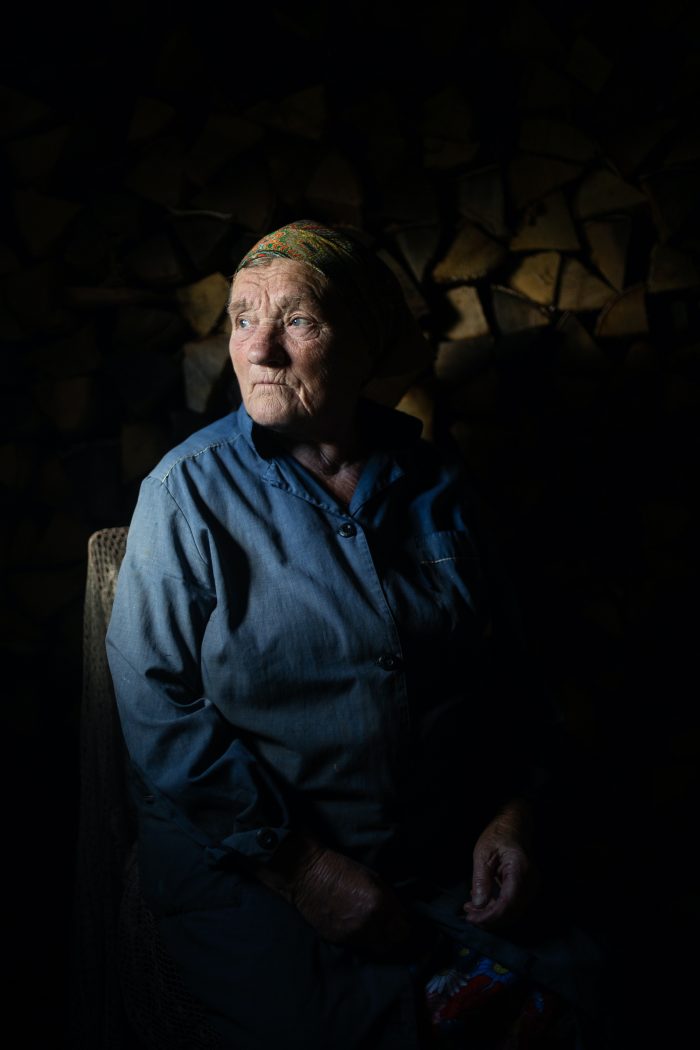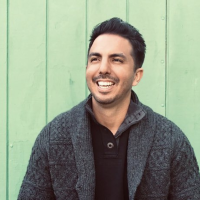
On an Air France flight from LAX to Charles De Gaulle Airport (Paris) en route to Dubai, I was set in between a woman in a burka and a plump elderly woman who spoke a language I didn’t recognize.
I took my seat, hopping over the little old woman’s blue grocery bag of collectibles that rested between her feet. After one of those awkward boarding shuffles, we exchanged a pleasant smile.
About an hour into the flight, as I was somewhere between being rocked to sleep by the hum of the airplane, and half watching “No Time to Die,” I saw the little old woman sitting, staring straight ahead. No book or TV screen to distract—just her and her thoughts in a pressurized environment. I drifted off a bit more…until I felt a light tap on my right shoulder. In a daze, not knowing who or what it was, I ignored it. The taps continued. The little old woman looked at me and started speaking to me.
She looked into my eyes, and with the utmost definitiveness, she began speaking in her foreign language, which sounded quite similar to Russian. As she finished up her statement, she nodded to check my understanding. I politely smiled and shrugged my shoulders, saying, “I don’t know,” as if she would understand that. Our words—lost in translation at 35,000 feet.
After a brief pause, she tried again. Using more hand motions and more emotion behind every movement, trying to emphasize what she was saying. It was a plea for me to understand her. Try as I may, I could not. It wasn’t until she pointed to her watch that I started to comprehend what she was asking for. Off with James Bond, and onto a world view. I clicked on the interactive flight map that included the time. I pointed to the “time at the departure airport,” and made a hand signal to show an airplane taking off (with some added sound effects).
Then, I pointed to the “time at arrival” and made a hand signal (with more added sound effects) of a plane landing. Finally, I pointed to the “Flight Time Remaining,” and followed that with a general pointing to everyone on the aircraft and while keeping the hand in the air. She gave me a thumbs-up, smiled, and kept nodding her head. Repeating, “Dyakuyu” (thank you). She had finally broken through to me. This would repeat about once an hour. Shoulder tap. Destination. Arrival. Polite smiles. Always being thanked with a thumbs-up, vigorous head nod, and a “Dyakuyu.”
This woman was all alone. No one spoke the same language as her. The flight attendants couldn’t understand her and she was definitive about what she wanted. Each side grew increasingly more frustrated that they couldn’t understand one another with something as simple as ordering a drink. I think we’ve all been around situations where it gets a bit uncomfortable as two sides try to come to some understanding but just can’t seem to do it for one reason or another. Being her now trusted ally, I served as the most underqualified interpreter of pseudo-Russian, but, mostly, of this woman’s desires for coffee, water, or a Coca-Cola when the frustration got too much for both sides to understand.
At about the seven or eight-hour mark, half asleep, watching another movie (the likes of which I can’t remember), I started to hear sniffles. I opened my right eye, looked over, and saw that the woman was crying. Not wanting to intrude, or perhaps, trying to ignore intuition, I just closed my eyes. As I did, I felt another tap on my shoulder.
After I had a dream a month and a half previously that got me to this plane, I made a commitment to no longer ignore intuition as best as I could. Now, life was literally tapping me on the shoulder to pay attention. This time, the woman looked at me with a newfound intensity and desperation. She started to speak faster and used bigger emotional hand gestures, desperate for me to understand. Finishing her statements with a slight nod, searching for my approval. She tried over and over again, and I signaled that I didn’t understand. I used hand signals to try to get her to explain, though now they were ineffective. She tried valiantly to be understood. Her frustration mounted and she threw her hands up and started to cry harder. I felt how badly this woman wanted to be heard, with no one around to listen.
We both went into a bit of a sad lull—wondering if we were to end our understanding here. That’s when I looked down and saw the legal pad that I carry with me for writing down ideas or plotting stories. I flipped to a blank page and drew a sad face. I tapped her on the shoulder, pointed to the sad face, and pointed to her. She nodded, wiping a tear. A sigh of relief that I was getting the picture. I handed her the pen and the legal pad and signaled to her to draw.
Excitedly, she drew a picture of a house. She followed that with three stick figures. A man, a woman, and a little boy. She signaled to the little boy and started talking feverishly. Somehow, I started to gather what she was talking about. I pointed to the little boy, and folded my arms like I was cradling a baby. She nodded and continued to draw and write out numbers. She wrote the numbers 29, 15, and 30. She then pointed to me. And I said, “Thirty-one,” signaling my age with my fingers. She started to cry a little more and pointed to the man as 30, and the woman as 29. She drew a house. And pointed to 15. I responded, “15 years?” Again making hand gestures, she nodded and seemingly understood.
She said, “College. College. College.” And I responded, “Your son is in college for 15 years?” She nodded and started to cry again. A slight smile emerged. I don’t know if I was even close to understanding what she was trying to say, but I can say that we both felt a sense of ease take over, as connection started to form.
She pointed to my face. Signaled around it, and made a gesture toward what looked like the man. This time, her cry wasn’t of frustration, it was a cry of what I can only explain as an amalgamation of longing for her son, and gratitude for this moment. She grabbed me by both shoulders and started to hug me. We were strangers on a plane, from two different worlds, and we were engaged in the most awkwardly comforting hug with our seatbelts securely fastened.
She pointed to herself once again and said, “Ukraine. Ukraine. Ukraine.” I showed her on the interactive map where Ukraine was in relation to France. She pointed to me and I said, “U.S.A., Los Angeles.” She smiled, patted me on the leg, and repeated, “Dyakuyu.”
As I laid back in my seat, suddenly, the magnitude of this moment and what she said, started to take over me. I reflected on the fact that as I left the United States for a breather from what I knew as my life, Russia was making aggressive advances toward the Ukrainian border—preparing to invade. The brink of an unprovoked war. This woman was headed back to a place where life was about to take on a whole new meaning—one of a grim future. A country where tomorrow soon would not be guaranteed. Everything she had ever known, and, perhaps, just met for the first time, could be taken away from her at the will of a maniacal autocrat.
As I sat with this, I thought of her. I thought of myself in her son’s situation and what I thought may be her new grandchild. I thought of both of my own grandmothers in her situation. And if we want to get really macro, I thought about what this meant on a global scale. But my thoughts always came back to the core human interaction that existed between myself and this little old Ukrainian woman. All she wanted, more than anything, was to be heard. To be seen.
Amongst the global headlines, the leaders of superpowers took center stage. However, at the true core of this conflict, the collateral damage at the intersection of ego and power, was this woman and her family back in America and whoever was waiting for her in Ukraine. She was potentially on the receiving end of the ultimate punishment. Her crime? Choosing to live in the place she knew as home.
Perhaps, she noticed the tailspin of my ephemeral existential thinking. She tapped me on the shoulder once again. Grabbed both sides of my face gently and spoke into my eyes. She spoke several sentences gently and definitively—an allusion to how the rest of the world would come to know Ukrainians. I hadn’t known this peace from her in our previous interactions, but I felt it in every word. I had no idea what she said, but I understood everything she was telling me. Almost as if it were one of my own grandmothers, knowing the exact thing to say at that moment to comfort me.
A few hours passed and we began the final descent. One last shoulder tap. She smiled and handed me her watch. I set it to the appropriate time for France. What looked like a watch she had worn for years, was a faithful companion to the moments of this woman’s life. Each tick now has more meaning and gravity than the ones before it. Each more definitive and seeking for themselves to be recognized as the last precious moments of what we would remember of the world as we knew it.
I handed the watch back to her. She put it on, smiled, and gave me one last “Dyakuyu.”
I have no idea if this woman knew what was waiting for her in the coming weeks. Her peace seemed infallible. Perhaps, she knew deeply what was waiting for her and was prepared. Or maybe, at the safety of 35,000 feet, it was one last bout of resistance to what she knew awaited her. Being understood, being seen for who she was, as she was, was perhaps all that she needed to accept what lay ahead.
In these times of war, I often think of that Ukrainian woman, hoping that she has found some safety and that hopefully, one day, she, along with all others in Ukraine, will be seen for her humanity once again.


 Share on bsky
Share on bsky




Read 10 comments and reply